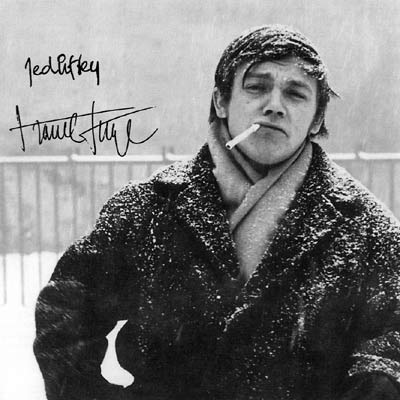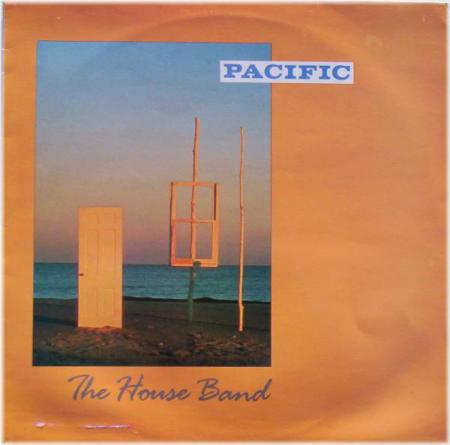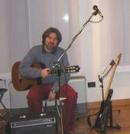Ha én rózsa volnék
Versione italiana di Alessandro

Alessandro aveva inviato questa canzone non accorgendosi che c'era già, ma registrata a nome della sua interprete Zsuzsa Koncz. Manteniamo ovviamente la traduzione italiana che aveva inviata, spostandola su questa pagina. Con questo invitiamo ancora una volta chiunque intenda proporre una canzone, a verificare prima (anche col titolo) se questa non sia già presente. [CCG/AWS Staff]
SE IO FOSSI UNA ROSA
(continua)
(continua)
inviata da CCG/AWS Staff 15/11/2008 - 19:17
Real Live Love

Album: City Garden [2006]
I was hopin' on something' that never cold be
(continua)
(continua)
inviata da giorgio 15/11/2008 - 16:30
NightTime For The Generals
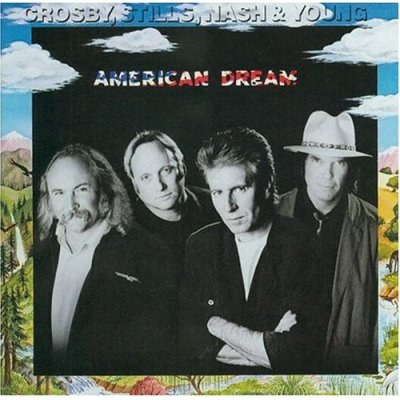
[1987]
Album: "American Dream"
Written by David Crosby & Craig Doerge
Album: "American Dream"
Written by David Crosby & Craig Doerge
Well it's nighttime and the long cars
(continua)
(continua)
inviata da giorgio 15/11/2008 - 15:13
Mon nom est Louis Roméi

[2008]
Album: "Les yeux cousus"
Album: "Les yeux cousus"
Mon nom est Louis Roméi, Louis Roméi.
(continua)
(continua)
inviata da adriana 15/11/2008 - 14:44
Border Wars
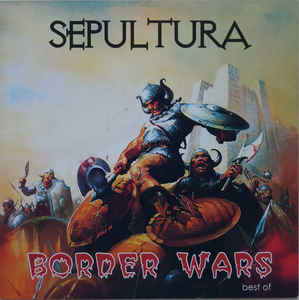
Album: Nation [2001]
Where am I to go? What do I have to do?
(continua)
(continua)
inviata da giorgio 15/11/2008 - 14:01
Vietnamerica
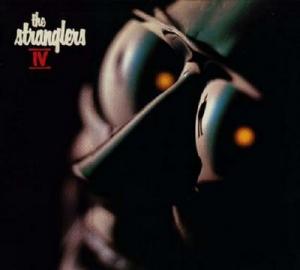
1980
Album: The Stranglers IV
Album: The Stranglers IV
It's over linger
(continua)
(continua)
inviata da giorgio 15/11/2008 - 11:36
Hangar 18

1990
Album: Rust In Peace
Album: Rust In Peace
Welcome to our fortress tall
(continua)
(continua)
inviata da giorgio 15/11/2008 - 10:34
The Great Satan

2006
Album: Rio Grande Blood
Album: Rio Grande Blood
"I believe the title was “Bid Laden determined to attack inside
(continua)
(continua)
inviata da giorgio 15/11/2008 - 10:00
Percorsi:
Il Diavolo
X-Ray Sun
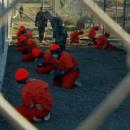
Chanson italienne - UN SOLE A RAGGI X – Les Anarchistes - 2005
Chanson consacrée au camp de Guantanamo, où les prisonniers ne sont pas des prisonniers, ce sont seulement des détenus;
Guantanamo, où les prisonniers se suicident uniquement pour ennuyer leurs gardiens;
Guantanamo, où à chaque instant, la nation étazunienne toute entière se déshonore;
Guantanamo, où l'État se cache derrière Dieu pour accomplir ses forfaits les plus ignobles et torture sans se retourner.
Conscience? Vous avez dit, conscience? J'ai dit conscience, moi? Comme c'est étrange!
Marco Valdo M.I.
Chanson consacrée au camp de Guantanamo, où les prisonniers ne sont pas des prisonniers, ce sont seulement des détenus;
Guantanamo, où les prisonniers se suicident uniquement pour ennuyer leurs gardiens;
Guantanamo, où à chaque instant, la nation étazunienne toute entière se déshonore;
Guantanamo, où l'État se cache derrière Dieu pour accomplir ses forfaits les plus ignobles et torture sans se retourner.
Conscience? Vous avez dit, conscience? J'ai dit conscience, moi? Comme c'est étrange!
Marco Valdo M.I.
LES RAYONS SOLAIRES X
(continua)
(continua)
inviata da Marco valdo M.I. 14/11/2008 - 22:30
Il maggio di Belgrado

Chanson italienne – Il maggio di Belgrado - Erri de Luca et Marco Rovelli – 2005
« J'ai connu Erri de Luca il y a des années, en me présentant à lui à la fin d'un débat dans une petite librairie de Rome. J'avais lu ses livres et ils m'avaient foudroyé. En particulier « Aceto, arcobaleno ». Ce fut l'éclair qui me réveilla ». Il m'invita chez lui...
Au cours des années, j'ai maintenu les contacts avec Erri De Luca, surtout par lettre, avec « mes invasions de champ » (pour lui voler une expression) à la recherche de critiques de mes écrits. Puis sont venus Les Anarchistes et j'ai pensé qu'il serait bien d'avoir des mots d'Erri à mettre en musique. Il m'a donné un texte sur le moment où il s'était fat citoyen de Belgrade en partageant les bombes de l'OTAN (nos bombes) avec ceux qui habitaient là avant lui.
Comme refrain à la chanson, il y a la traduction faite par Erri du troisième et quatrième... (continua)
« J'ai connu Erri de Luca il y a des années, en me présentant à lui à la fin d'un débat dans une petite librairie de Rome. J'avais lu ses livres et ils m'avaient foudroyé. En particulier « Aceto, arcobaleno ». Ce fut l'éclair qui me réveilla ». Il m'invita chez lui...
Au cours des années, j'ai maintenu les contacts avec Erri De Luca, surtout par lettre, avec « mes invasions de champ » (pour lui voler une expression) à la recherche de critiques de mes écrits. Puis sont venus Les Anarchistes et j'ai pensé qu'il serait bien d'avoir des mots d'Erri à mettre en musique. Il m'a donné un texte sur le moment où il s'était fat citoyen de Belgrade en partageant les bombes de l'OTAN (nos bombes) avec ceux qui habitaient là avant lui.
Comme refrain à la chanson, il y a la traduction faite par Erri du troisième et quatrième... (continua)
LE MAI DE BELGRADE
(continua)
(continua)
inviata da Marco Valdo M.I. 14/11/2008 - 21:11
Brother Against Brother
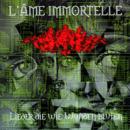
FRATELLO CONTRO FRATELLO
(continua)
(continua)
inviata da Moira Giusti 14/11/2008 - 19:10
Le triangle des Bermudes

Dal volume "Canta che non ti passa - Storie e canzoni di autori in rivolta francesi, ispanici e slavi", Stampa Alternativa/Nuovi Equilibri, 2008, p. 100. Inspiegabilmente, nella traduzione di Alessio il "Sahel" è sostituito con il "Sahara" (scelta o svista?)
IL TRIANGOLO DELLE BERMUDE
(continua)
(continua)
inviata da CCG/AWS Staff 14/11/2008 - 18:48
C'era un ragazzo che come me amava i Beatles e i Rolling Stones
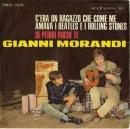
ciao a tutti e complimenti per questo sito!
14/11/2008 - 10:49
Children Of The Delta
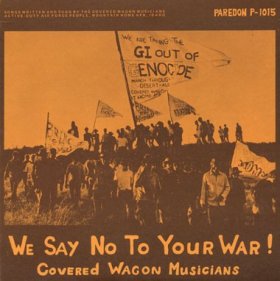
[1972]
From "We Say No To Your War!"
words and music by A1C Jim Schaffer
Dedicated to the victims of the genocidal war in which so many young Americans took part before they had the possibility of understanding it. This song is excellent for teaching a crowd to join in, and the chorus lends itself to being sung as a round, with half the group singing "seize the time, organize" and then the other half beginning likewise. When at a signal the two halves meet again for a unison ending, it graphically demonstrates the qualities the song describes. Different lead singers can take the three verses, with the group joining in the response after each line. Sing it with feeling!
Covered Wagon Musicians
We Say No To Your War!
Paredon 1015, Smithsonian Folkways Recordings, 1972
1. Mathematics (Spoken)
2. Silver Bird
3. Phantom Jets Are Coming
4. The Rodenway Nine
5. Spring Conscience
6. Mathematics... (continua)
From "We Say No To Your War!"
words and music by A1C Jim Schaffer
Dedicated to the victims of the genocidal war in which so many young Americans took part before they had the possibility of understanding it. This song is excellent for teaching a crowd to join in, and the chorus lends itself to being sung as a round, with half the group singing "seize the time, organize" and then the other half beginning likewise. When at a signal the two halves meet again for a unison ending, it graphically demonstrates the qualities the song describes. Different lead singers can take the three verses, with the group joining in the response after each line. Sing it with feeling!
Covered Wagon Musicians
We Say No To Your War!
Paredon 1015, Smithsonian Folkways Recordings, 1972
1. Mathematics (Spoken)
2. Silver Bird
3. Phantom Jets Are Coming
4. The Rodenway Nine
5. Spring Conscience
6. Mathematics... (continua)
(Spoken)
(continua)
(continua)
inviata da Alessandro 14/11/2008 - 09:36
Napalm Sticks To Kids
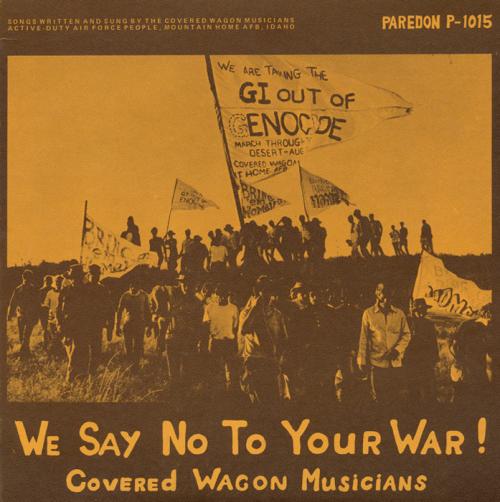
[1970]
Scritta collettivamente da un gruppo di soldati americani
dell’Aeronautica e delle Forze Armate assegnati al 1st Air Cavalry in Vietnam
Collectively written by Air Force and Army GIs attached to the 1st Air Cavalry in Vietnam.
Prima registrazione / First Recording: First of the Ninth Chorus, 1970, Phước Vĩnh Base Camp, South Vietnam / Vietnam del Sud
Versione dei Covered Wagon Musicians recitata dal serg. John Boychuk :
Covered Wagon Musicians version recited by Sgt John Boychuk:
"We Say No To Your War!", 1972
Una canzone terribile, di quelle cantate dai massacratori della "cavalleria" aerea così bene disegnati da Francis Ford Coppola in "Apocalypse Now"... Non avrei postato il testo se non lo avessi trovato come brano incluso in "We Say No To Your War!" con la seguente spiegazione:
A group of Air Force and Army GIs assigned to the 1st Air Cavalry sat down one night in... (continua)
Scritta collettivamente da un gruppo di soldati americani
dell’Aeronautica e delle Forze Armate assegnati al 1st Air Cavalry in Vietnam
Collectively written by Air Force and Army GIs attached to the 1st Air Cavalry in Vietnam.
Prima registrazione / First Recording: First of the Ninth Chorus, 1970, Phước Vĩnh Base Camp, South Vietnam / Vietnam del Sud
Versione dei Covered Wagon Musicians recitata dal serg. John Boychuk :
Covered Wagon Musicians version recited by Sgt John Boychuk:
"We Say No To Your War!", 1972
Una canzone terribile, di quelle cantate dai massacratori della "cavalleria" aerea così bene disegnati da Francis Ford Coppola in "Apocalypse Now"... Non avrei postato il testo se non lo avessi trovato come brano incluso in "We Say No To Your War!" con la seguente spiegazione:
A group of Air Force and Army GIs assigned to the 1st Air Cavalry sat down one night in... (continua)
We shoot the sick, the young, the lame,
(continua)
(continua)
inviata da Alessandro 14/11/2008 - 09:32
Percorsi:
Guerra in Vietnam: vista dagli USA
Bring Our Brothers Home

[1972]
From "We Say No To Your War!"
words and music by A1C George Herkert from Mountain Home USAF Base, Idaho.
George Herkert was one of the first singers at the Wagon. He led group singing at the first public meeting of the Wagon and although he has long since left the Air Force and Idaho this song of his remains with us.
From "We Say No To Your War!"
words and music by A1C George Herkert from Mountain Home USAF Base, Idaho.
George Herkert was one of the first singers at the Wagon. He led group singing at the first public meeting of the Wagon and although he has long since left the Air Force and Idaho this song of his remains with us.
Covered Wagon Musicians
We Say No To Your War!
Paredon 1015, Smithsonian Folkways Recordings, 1972
1. Mathematics (Spoken)
2. Silver Bird
3. Phantom Jets Are Coming
4. The Rodenway Nine
5. Spring Conscience
6. Mathematics (Sung)
7. We Say No To Your War!
8. The People’s Thank You
9. My Pledge, My Vow
10. Bring Our Brothers Home
11. Napalm Sticks To Kids
12. Children of the Delta
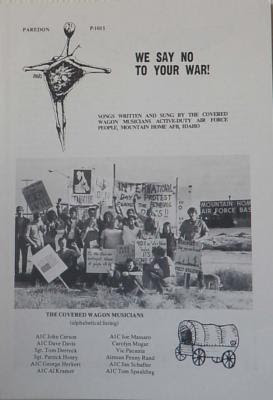
Sgt. John Boychuk
AIC John Carson
AIC Dave Davis
Sgt. Tom Derreck
Sgt. Patrick Henry
AIC George Herkert
AIC Al Kramer
AIC Joe Massaro
Carolyn Mugar
Vic Pacania
Airman Penny Rand
AIC Jim Schaffer
AIC Tom Spaulding
We Say No To Your War!
Paredon 1015, Smithsonian Folkways Recordings, 1972
1. Mathematics (Spoken)
2. Silver Bird
3. Phantom Jets Are Coming
4. The Rodenway Nine
5. Spring Conscience
6. Mathematics (Sung)
7. We Say No To Your War!
8. The People’s Thank You
9. My Pledge, My Vow
10. Bring Our Brothers Home
11. Napalm Sticks To Kids
12. Children of the Delta

Sgt. John Boychuk
AIC John Carson
AIC Dave Davis
Sgt. Tom Derreck
Sgt. Patrick Henry
AIC George Herkert
AIC Al Kramer
AIC Joe Massaro
Carolyn Mugar
Vic Pacania
Airman Penny Rand
AIC Jim Schaffer
AIC Tom Spaulding
You sent us off to fight this war:
(continua)
(continua)
inviata da Alessandro 14/11/2008 - 09:25
The Rodeway Nine

[1972]
From "We Say No To Your War!"
words by Mark Lane and Jim Shaffer
music by Jim Shaffer
Outside the Rodeway Inn where the Boise Chamber of Commerce were honoring General Westmoreland in August, 1971. Nine Covered Wagon members were arrested for "disturbing the peace" and three others charged with "interfering with the police." This song played an important part in the state-wide campaign to win an acquittal for them. After the charges were finally dropped, some of the defendants filed charges against the police on behalf of the Covered Wagon.
The song "The Rodeway Nine" referenced the My Lai Massacre, Lyndon Baines Johnson (LBJ), and General Westmoreland. Composed by Mark Lane and Jim Shaffer, the record booklet said the following about this song: "outside the Rodeway Inn where the Boise Chamber of Commerce were honoring General Westmoreland in August in 1971. Nine Covered Wagon... (continua)
From "We Say No To Your War!"
words by Mark Lane and Jim Shaffer
music by Jim Shaffer
Outside the Rodeway Inn where the Boise Chamber of Commerce were honoring General Westmoreland in August, 1971. Nine Covered Wagon members were arrested for "disturbing the peace" and three others charged with "interfering with the police." This song played an important part in the state-wide campaign to win an acquittal for them. After the charges were finally dropped, some of the defendants filed charges against the police on behalf of the Covered Wagon.
The song "The Rodeway Nine" referenced the My Lai Massacre, Lyndon Baines Johnson (LBJ), and General Westmoreland. Composed by Mark Lane and Jim Shaffer, the record booklet said the following about this song: "outside the Rodeway Inn where the Boise Chamber of Commerce were honoring General Westmoreland in August in 1971. Nine Covered Wagon... (continua)
(Spoken)
(continua)
(continua)
inviata da Alessandro 14/11/2008 - 09:17
Phantom Jets Are Coming

[1972]
From "We Say No To Your War!"
Words and music by AIC Jim Schaffer.
Back in his pre-Wagon days when Jim was into psychedelics, he wrote a song most people had trouble understanding and he found impossible to explain. When the smoke of the war burned his eyes, he saw things in a different way. He made a few changes in the lyrics, and it became "Phantom Jets are Coming."
From "We Say No To Your War!"
Words and music by AIC Jim Schaffer.
Back in his pre-Wagon days when Jim was into psychedelics, he wrote a song most people had trouble understanding and he found impossible to explain. When the smoke of the war burned his eyes, he saw things in a different way. He made a few changes in the lyrics, and it became "Phantom Jets are Coming."
Covered Wagon Musicians
We Say No To Your War!
Paredon 1015, Smithsonian Folkways Recordings, 1972
1. Mathematics (Spoken)
2. Silver Bird
3. Phantom Jets Are Coming
4. The Rodenway Nine
5. Spring Conscience
6. Mathematics (Sung)
7. We Say No To Your War!
8. The People’s Thank You
9. My Pledge, My Vow
10. Bring Our Brothers Home
11. Napalm Sticks To Kids
12. Children of the Delta

Sgt. John Boychuk
AIC John Carson
AIC Dave Davis
Sgt. Tom Derreck
Sgt. Patrick Henry
AIC George Herkert
AIC Al Kramer
AIC Joe Massaro
Carolyn Mugar
Vic Pacania
Airman Penny Rand
AIC Jim Schaffer
AIC Tom Spaulding
We Say No To Your War!
Paredon 1015, Smithsonian Folkways Recordings, 1972
1. Mathematics (Spoken)
2. Silver Bird
3. Phantom Jets Are Coming
4. The Rodenway Nine
5. Spring Conscience
6. Mathematics (Sung)
7. We Say No To Your War!
8. The People’s Thank You
9. My Pledge, My Vow
10. Bring Our Brothers Home
11. Napalm Sticks To Kids
12. Children of the Delta

Sgt. John Boychuk
AIC John Carson
AIC Dave Davis
Sgt. Tom Derreck
Sgt. Patrick Henry
AIC George Herkert
AIC Al Kramer
AIC Joe Massaro
Carolyn Mugar
Vic Pacania
Airman Penny Rand
AIC Jim Schaffer
AIC Tom Spaulding
Well, the Phantom Jets are coming
(continua)
(continua)
inviata da Alessandro 14/11/2008 - 09:12
Silver Bird

[1972]
From "We Say No To Your War!"
Lyrics by A1C Jim Schaffer and Sgt. Mark Lane (ret.)
music by A1C Jim Schaffer
The first verse expresses the mood of returning GIs, their feeling of alienation from the Air Force, and their determination to be a part of the machine no longer. The second verse was a personal statement by Jim Shaffer, just before he was discharged as a conscientious objector. Combining the two poems and adding music produced the first song written at the project.
Covered Wagon Musicians
We Say No To Your War!
Paredon 1015, Smithsonian Folkways Recordings, 1972
1. Mathematics (Spoken)
2. Silver Bird
3. Phantom Jets Are Coming
4. The Rodenway Nine
5. Spring Conscience
6. Mathematics (Sung)
7. We Say No To Your War!
8. The People’s Thank You
9. My Pledge, My Vow
10. Bring Our Brothers Home
11. Napalm Sticks To Kids
12. Children of the Delta
Sgt. John Boychuk
AIC... (continua)
From "We Say No To Your War!"
Lyrics by A1C Jim Schaffer and Sgt. Mark Lane (ret.)
music by A1C Jim Schaffer
The first verse expresses the mood of returning GIs, their feeling of alienation from the Air Force, and their determination to be a part of the machine no longer. The second verse was a personal statement by Jim Shaffer, just before he was discharged as a conscientious objector. Combining the two poems and adding music produced the first song written at the project.
Covered Wagon Musicians
We Say No To Your War!
Paredon 1015, Smithsonian Folkways Recordings, 1972
1. Mathematics (Spoken)
2. Silver Bird
3. Phantom Jets Are Coming
4. The Rodenway Nine
5. Spring Conscience
6. Mathematics (Sung)
7. We Say No To Your War!
8. The People’s Thank You
9. My Pledge, My Vow
10. Bring Our Brothers Home
11. Napalm Sticks To Kids
12. Children of the Delta
Sgt. John Boychuk
AIC... (continua)
Silver bird go fly alone
(continua)
(continua)
inviata da Alessandro 14/11/2008 - 09:09
Mathematics

[1972]
Lyrics and music / Testo e musica / Paroles et musique / Sanat ja sävel:
AIC Jim Schaffer, Mountain Home USAF Base
Album / Albumi: We Say No To War!
"An appeal to middle America to listen to the GIs, and so they wanted to open the record with it. Probably the most popular song at the Wagon. At a concert, Jim Schaffer was asked why he called it "Mathematics." He thought a moment and then said: "It's about the war. The war divides us, it subtracts our humanity, and multiplies our problems. There's nothing else to add".
Il brano di apertura dell’album è, in realtà, ripetuto due volte: all’inizio senza musica, soltanto recitato (“spoken”) dal suo autore, AIC Jim Schaffer:
La versione “sung” (sempre da Jim Schaffer) è invece la traccia n° 6 nell’album. Un appello all’ “America media” ad ascoltare i soldati; per questo è la traccia di apertura. Si tratta probabilmente del brano... (continua)
Lyrics and music / Testo e musica / Paroles et musique / Sanat ja sävel:
AIC Jim Schaffer, Mountain Home USAF Base
Album / Albumi: We Say No To War!
"An appeal to middle America to listen to the GIs, and so they wanted to open the record with it. Probably the most popular song at the Wagon. At a concert, Jim Schaffer was asked why he called it "Mathematics." He thought a moment and then said: "It's about the war. The war divides us, it subtracts our humanity, and multiplies our problems. There's nothing else to add".
Il brano di apertura dell’album è, in realtà, ripetuto due volte: all’inizio senza musica, soltanto recitato (“spoken”) dal suo autore, AIC Jim Schaffer:
La versione “sung” (sempre da Jim Schaffer) è invece la traccia n° 6 nell’album. Un appello all’ “America media” ad ascoltare i soldati; per questo è la traccia di apertura. Si tratta probabilmente del brano... (continua)
Fifty stars sway with the wind
(continua)
(continua)
inviata da Alessandro 14/11/2008 - 09:06
We Say No To Your War!

[1972]
lyrics by Sgt. Mark Lane
music by A1C Jim Schaffer and A1C George Herkert
Canzone che dà il titolo al disco realizzato dalla band del movimento no-war in Vietnam "The Covered Wagon" costituitosi l'anno precedente fra i GIs della base aerea militare statunitense di Mountain Home, Idaho, luogo di partenza degli F-4 Phantom ed F-111 che bombardavano il Vietnam.
"The Covered Wagoon" pubblicava la rivista intitolata "Helping Hand". La copertina del primo numero della rivista riportava la foto di un bambino che impugna un'arma, foto scattata nella base stessa durante la giornata delle forze armate, accompagnata dalla scritta "Never Again!"
Inutile dire che la giornata delle forze armate non si tenne più a Mountain Home...
Sia il nome del movimento che della rivista fanno riferimento a frasi in codice militare che indicano atti di sabotaggio.
Nell'agosto del 1971, ricorrendo l'anniversario... (continua)
lyrics by Sgt. Mark Lane
music by A1C Jim Schaffer and A1C George Herkert
Canzone che dà il titolo al disco realizzato dalla band del movimento no-war in Vietnam "The Covered Wagon" costituitosi l'anno precedente fra i GIs della base aerea militare statunitense di Mountain Home, Idaho, luogo di partenza degli F-4 Phantom ed F-111 che bombardavano il Vietnam.
"The Covered Wagoon" pubblicava la rivista intitolata "Helping Hand". La copertina del primo numero della rivista riportava la foto di un bambino che impugna un'arma, foto scattata nella base stessa durante la giornata delle forze armate, accompagnata dalla scritta "Never Again!"
Inutile dire che la giornata delle forze armate non si tenne più a Mountain Home...
Sia il nome del movimento che della rivista fanno riferimento a frasi in codice militare che indicano atti di sabotaggio.
Nell'agosto del 1971, ricorrendo l'anniversario... (continua)
Well we marched many miles
(continua)
(continua)
inviata da Alessandro 14/11/2008 - 08:59
L'Ultimo Partigiano

2008
Per il sonno, per l'ipnosi o per il vino
L'Ultimo Partigiano è un pezzo per ricordare la Resistenza, la lotta gli i partigiani hanno fatto contro il nazifascismo. Perchè quei valori siano vivi anche oggi, perchè quegli ideali continuino ad esistere nella società contemporanea. Per ricordare e non dimenticare... Una ballata folk-rock con assolo di chitarra alla fine.
Per il sonno, per l'ipnosi o per il vino
L'Ultimo Partigiano è un pezzo per ricordare la Resistenza, la lotta gli i partigiani hanno fatto contro il nazifascismo. Perchè quei valori siano vivi anche oggi, perchè quegli ideali continuino ad esistere nella società contemporanea. Per ricordare e non dimenticare... Una ballata folk-rock con assolo di chitarra alla fine.
Corre sulle aspre montagne,
(continua)
(continua)
inviata da adriana 14/11/2008 - 08:16
La ballata ti lu clandestinu

[2006]
Album :La ballata ti lu clandestinu
Album :La ballata ti lu clandestinu
Questa è la ballata ti lu clandestinu
(continua)
(continua)
inviata da adriana 13/11/2008 - 19:21
La storia del perdente
Oscurarono anzitempo la terra e il cielo
(continua)
(continua)
inviata da adriana 13/11/2008 - 18:56
Teresa stanca di guerra

Registrata all'insaputa di Teresa in una pausa del lavoro nel pomeriggio del 25 giugno 1993
(nota al testo trovato sul sito della De Sio)
Un testo troppo breve per dire che la canzone sia stata ispirata dal romanzo di Jorge Amado "Teresa Batista, stanca di guerra" (1972)...
(nota al testo trovato sul sito della De Sio)
Un testo troppo breve per dire che la canzone sia stata ispirata dal romanzo di Jorge Amado "Teresa Batista, stanca di guerra" (1972)...
Teresa stanca di guerra
(continua)
(continua)
inviata da Alessandro 13/11/2008 - 18:44
Sacco e fuoco

"TERESA RINGRAZIA
chi non tiene paura, i briganti e le brigantesse di tutte le epoche, le figlie di re che hanno perso la corona, la disobbedienza che è un metro per misurare il mondo, l’intelligenza perché salverà la terra dai cretini, mai caricati a salve, chi festeggia la morte dei tiranni, le femmine che vogliono vivere e amare libere come pesci nel mare e poi finiscono fritte nella “tielluzza”, chi resta e resiste nella splendida e miserabile città di Napoli, gli stati di grazia difficili da mantenere, la poesia e la scienza che nulla sanno l’una dell’altra ma entrambe possono dirci cose sul cielo stellato, chi ancora ha una bussola, un vento e una bandiera, chi non vuole tenere padroni, i piccoli musicisti senza lavoro e il lavoro dei grandi da cui si può imparare, la musica popolare quando ci insegna la danza interiore e, infine, il potere della passione, la sola battaglia che non... (continua)
chi non tiene paura, i briganti e le brigantesse di tutte le epoche, le figlie di re che hanno perso la corona, la disobbedienza che è un metro per misurare il mondo, l’intelligenza perché salverà la terra dai cretini, mai caricati a salve, chi festeggia la morte dei tiranni, le femmine che vogliono vivere e amare libere come pesci nel mare e poi finiscono fritte nella “tielluzza”, chi resta e resiste nella splendida e miserabile città di Napoli, gli stati di grazia difficili da mantenere, la poesia e la scienza che nulla sanno l’una dell’altra ma entrambe possono dirci cose sul cielo stellato, chi ancora ha una bussola, un vento e una bandiera, chi non vuole tenere padroni, i piccoli musicisti senza lavoro e il lavoro dei grandi da cui si può imparare, la musica popolare quando ci insegna la danza interiore e, infine, il potere della passione, la sola battaglia che non... (continua)
Alessandro 13/11/2008 - 18:28
Bella Ciao
anonimo

4. "E picchia picchia alla porticella" - Alle radici di "Bella ciao"
4. "E picchia picchia alla porticella" - Back to the roots of "Bella ciao"
Interpretata da Orietta Berti.
4. "E picchia picchia alla porticella" - Back to the roots of "Bella ciao"
Interpretata da Orietta Berti.
E picchia picchia la porticella
(continua)
(continua)
inviata da CCG/AWS Staff 13/11/2008 - 18:13
Le Président et l'éléphant

13 novembre 2008
IL PRESIDENTE E L'ELEFANTE
(continua)
(continua)
13/11/2008 - 17:59
La tradotta che parte da Novara
anonimo

La tradotta da Novara andava al Montesanto, un'altura nei pressi di Gorizia conquistata solo con l'XI Battaglia dell'Isonzo nell'estate del 1917 (altura sulla quale si erano infranti vari assalti a cavallo e dopo la conquista di Gorizia con la VI battaglia carsica dal 4 al 17 agosto 1916). Questa semplice constatazione pone il canto in posizione temporale antecedente la ben più famosa "Tradotta da Torino", legata al disperato afflusso di nuove truppe, tra cui la classe 1899, che tamponarono il primo assalto sul Piave tra il novembre e il dicembre del 1917, per poi impedire il dilagamento verso i ponti della Priula con continui contrattacchi in quella che è diventata la battaglia di Nervesa.
Leggendo il testo proposto e la musica della versione "Novara", oltre ai brividi (studio storia militare, ma ODIO la guerra), sono rimasto molto perplesso: considerato che possa essere stata composta... (continua)
Leggendo il testo proposto e la musica della versione "Novara", oltre ai brividi (studio storia militare, ma ODIO la guerra), sono rimasto molto perplesso: considerato che possa essere stata composta... (continua)
Massimo Giacomazzo 13/11/2008 - 16:07
Stung Right
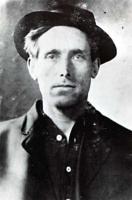
[1913]
Lyrics by Joe Hill
Tune: "Sunlight, Sunlight" (W. S. Weeden)
"Well war certainly shows up the capitalist system in the right light. Millions of men are employed at making ships and others are hired to sink them. Scientific management, eh, wot?"
from a Joe Hill's letter to Sam Murray, 9 September 1915, in "The Last Letters of Joe Hill," p. 54; also in Foner, Letters of Joe Hill, p. 56.
"Stung Right" chronicles the lament of a worker enticed into joining "uncle Sammy's fleet" by promises of a trip around the world. According to Hill, the Navy, rather than improving his situation, worsens it by offering only hard work and bad food.
Trovata su Songs of Joe Hill
Lyrics by Joe Hill
Tune: "Sunlight, Sunlight" (W. S. Weeden)
"Well war certainly shows up the capitalist system in the right light. Millions of men are employed at making ships and others are hired to sink them. Scientific management, eh, wot?"
from a Joe Hill's letter to Sam Murray, 9 September 1915, in "The Last Letters of Joe Hill," p. 54; also in Foner, Letters of Joe Hill, p. 56.
"Stung Right" chronicles the lament of a worker enticed into joining "uncle Sammy's fleet" by promises of a trip around the world. According to Hill, the Navy, rather than improving his situation, worsens it by offering only hard work and bad food.
Trovata su Songs of Joe Hill
When I was hiking 'round the town to find a job one day,
(continua)
(continua)
inviata da Alessandro 13/11/2008 - 15:23
Business Goes On As Usual

Lyrics by Fred Hellerman
Music by Fran Minkoff
Interpretata anche dalla grande soul singer Roberta Flack in "Chapter Two" (1970) e, mi pare, pure da John Denver...
Trovata su Mudcat
Music by Fran Minkoff
Interpretata anche dalla grande soul singer Roberta Flack in "Chapter Two" (1970) e, mi pare, pure da John Denver...
Trovata su Mudcat
Business goes on
(continua)
(continua)
inviata da Alessandro 13/11/2008 - 12:55
P.T. aus Arizona

La storia di una diserzione dalla U.S. Army da parte di un soldato di stanza in Germania (K-Town = Kaiserslautern).
Trovata sul sito dell'autore e tradotta in inglese, ma solo parzialmente, su Mudcat.
Trovata sul sito dell'autore e tradotta in inglese, ma solo parzialmente, su Mudcat.
P.T. aus Arizona
(continua)
(continua)
inviata da Alessandro 13/11/2008 - 12:04
Percorsi:
Disertori
You Ain't Talkin' to Me
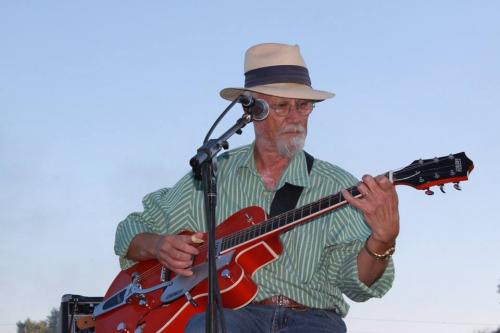
(1985)
Album: Friends For Lunch
Testo di Charlie Poole (1927) strofe 1-3; Jim Krause (1985) strofe 4-6
Words by Charlie Poole (1927) verses 1-3; Jim Krause (1985) verses 4-6
Musica di (o ripresa da) Charlie Poole (1927)
Tune of (or reused) by Charlie Poole (1927)
Una parodia di una canzone di Charlie Poole risalente agli anni '20.
A parody of a song from the '20s by Charlie Poole
English
Italiano
Livornese
"The Alferd Packer Memorial String Band is five multi-instrumentalists, dressed in old time costumes, singing and playing fiddles, banjo, guitars, mandolin, hammered dulcimer, accordion, bass, and creative percussion. The band has been featured on CBS Sunday Morning with Bill Geist, and in a documentary called “Overlooked” which aired on KTKA-TV. They were the focus of articles in the Wall Street Journal, New York Times and Readers’ Digest. Their music has been used... (continua)
Album: Friends For Lunch
Testo di Charlie Poole (1927) strofe 1-3; Jim Krause (1985) strofe 4-6
Words by Charlie Poole (1927) verses 1-3; Jim Krause (1985) verses 4-6
Musica di (o ripresa da) Charlie Poole (1927)
Tune of (or reused) by Charlie Poole (1927)
Una parodia di una canzone di Charlie Poole risalente agli anni '20.
A parody of a song from the '20s by Charlie Poole
English
Italiano
Livornese
"The Alferd Packer Memorial String Band is five multi-instrumentalists, dressed in old time costumes, singing and playing fiddles, banjo, guitars, mandolin, hammered dulcimer, accordion, bass, and creative percussion. The band has been featured on CBS Sunday Morning with Bill Geist, and in a documentary called “Overlooked” which aired on KTKA-TV. They were the focus of articles in the Wall Street Journal, New York Times and Readers’ Digest. Their music has been used... (continua)
I went up to a lady's house
(continua)
(continua)
inviata da Alessandro + CCG/AWS Staff 13/11/2008 - 11:49
The Valley Of The Shadow
Our great attack had failed
(continua)
(continua)
inviata da Alessandro 13/11/2008 - 09:16
All the Fine Young Men

Lyrics by Eric Bogle
Melody by John Munro
Melody by John Munro
They told all the fine young men
(continua)
(continua)
inviata da Alessandro 13/11/2008 - 08:57
Shoes
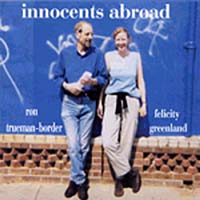
Una canzone dedicata alla strage di Morecombe Bay, North West England, Regno Unito, 5 febbraio 2004.
Un gruppo di lavoratori cinesi addetti alla raccolta delle vongole, immigrati irregolari schiavizzati dai mercanti di braccia, inesperti, non addestrati, furono sorpresi dalla rimonta della marea: 23 di loro, uomini e donne tra i 18 e 45 anni, persero la vita.
2 corpi non furono mai ritrovati, e nemmeno si sa chi fossero.
Nel 2006, il regista Nick Broomfield ha diretto un film dedicato a questo episodio: si intitola sigificativamente "Ghosts".
Un gruppo di lavoratori cinesi addetti alla raccolta delle vongole, immigrati irregolari schiavizzati dai mercanti di braccia, inesperti, non addestrati, furono sorpresi dalla rimonta della marea: 23 di loro, uomini e donne tra i 18 e 45 anni, persero la vita.
2 corpi non furono mai ritrovati, e nemmeno si sa chi fossero.
Nel 2006, il regista Nick Broomfield ha diretto un film dedicato a questo episodio: si intitola sigificativamente "Ghosts".
Seaside town winters day English skies are always grey
(continua)
(continua)
inviata da Alessandro 13/11/2008 - 08:39
Morphine
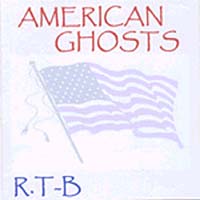
[2000]
Album "American Ghosts"
Album "American Ghosts"
I was a boy in that man’s world, sent to fight on foreign shores
(continua)
(continua)
inviata da Alessandro 13/11/2008 - 08:15
Death Of A Soldier
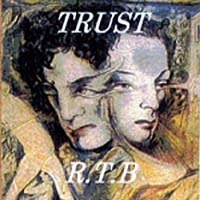
He was court-martialled one morning in May
(continua)
(continua)
inviata da Alessandro 13/11/2008 - 08:01
Братские могилы
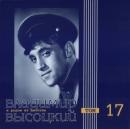
Da "Compagnia cantante", CD allegato al volume "Canta che non ti passa - Storie e canzoni di autori in rivolta francesi, ispanici e slavi", Stampa Alternativa/Nuovi Equilibri, 2008
LE FOSSE COMUNI
(continua)
(continua)
inviata da CCG/AWS Staff 13/11/2008 - 01:25
Le déserteur
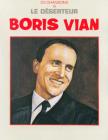
Una notizia nè buona nè cattiva, visto che ammazzare li hanno ammazzati, come dei cani...
Da La Repubblica del 12 novembre 2008
Grande guerra, strappo di Sarkozy "Onore ai fucilati per diserzione"
di Giampiero Martinotti
PARIGI - Gli ammutinati, i disertori, i disobbedienti, tutti i soldati che durante la Grande Guerra furono fucilati «per l´esempio» non si erano disonorati e oggi dobbiamo ricordare la loro memoria come quella di tutti i caduti: per la prima volta, un presidente francese ha politicamente riabilitato i 675 militari giustiziati tra il 1914 e il 1918.
Commemorando l´armistizio firmato novant´anni fa, vicino a Verdun, Nicolas Sarkozy ha trovato il tono e le parole giuste per rendere omaggio a quei soldati coperti dall´ignominia ufficiale e di cui da tempo molte associazioni chiedevano la riabilitazione.
Accanto a Sarkozy c´erano Carlo d´Inghilterra e molti leader europei.... (continua)
Da La Repubblica del 12 novembre 2008
Grande guerra, strappo di Sarkozy "Onore ai fucilati per diserzione"
di Giampiero Martinotti
PARIGI - Gli ammutinati, i disertori, i disobbedienti, tutti i soldati che durante la Grande Guerra furono fucilati «per l´esempio» non si erano disonorati e oggi dobbiamo ricordare la loro memoria come quella di tutti i caduti: per la prima volta, un presidente francese ha politicamente riabilitato i 675 militari giustiziati tra il 1914 e il 1918.
Commemorando l´armistizio firmato novant´anni fa, vicino a Verdun, Nicolas Sarkozy ha trovato il tono e le parole giuste per rendere omaggio a quei soldati coperti dall´ignominia ufficiale e di cui da tempo molte associazioni chiedevano la riabilitazione.
Accanto a Sarkozy c´erano Carlo d´Inghilterra e molti leader europei.... (continua)
Alessandro 12/11/2008 - 21:16
Братские могилы

Versione inglese di Kulichiki da russmus.net
BROTHERLY GRAVES
(continua)
(continua)
inviata da Riccardo Venturi 12/11/2008 - 18:45
La domenica delle salme
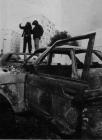
QUELL'ODIO VERSO GLI ULTIMI
di Michele Serra
Repubblica Online, 12 novembre 2008
"GLI incendiarono il letto sulla strada di Trento", cantava Fabrizio De André nella splendida e spaventosa Domenica delle salme, rassegna degli orrori sociali in atto e in preparazione nei ruggenti Ottanta. Raccontava di un clochard bruciato vivo dai giovanotti di Ludwig, usciti dall'inferno e dunque innamorati delle fiamme. Da ieri anche una panchina di Rimini, dimora abituale di un senzatetto italiano che si chiama Andrea, è annerita dal fuoco. Anche a lui "incendiarono il letto". Ora è in ospedale a Padova, con il quaranta per cento del corpo coperto di ustioni, di piaghe e dolore.
La panchina, vuota, campeggia in ogni pagina di carta o di pixel, e dopo il rogo ha lo stesso colore indefinito e scuro dei rifiuti. Accanto c'è una bottiglia vuota: conteneva la benzina che ha bruciato Andrea, all'una di notte,... (continua)
di Michele Serra
Repubblica Online, 12 novembre 2008
"GLI incendiarono il letto sulla strada di Trento", cantava Fabrizio De André nella splendida e spaventosa Domenica delle salme, rassegna degli orrori sociali in atto e in preparazione nei ruggenti Ottanta. Raccontava di un clochard bruciato vivo dai giovanotti di Ludwig, usciti dall'inferno e dunque innamorati delle fiamme. Da ieri anche una panchina di Rimini, dimora abituale di un senzatetto italiano che si chiama Andrea, è annerita dal fuoco. Anche a lui "incendiarono il letto". Ora è in ospedale a Padova, con il quaranta per cento del corpo coperto di ustioni, di piaghe e dolore.
La panchina, vuota, campeggia in ogni pagina di carta o di pixel, e dopo il rogo ha lo stesso colore indefinito e scuro dei rifiuti. Accanto c'è una bottiglia vuota: conteneva la benzina che ha bruciato Andrea, all'una di notte,... (continua)
CCG/AWS Staff 12/11/2008 - 18:25
The Man I Killed

[2002]
Dall'album "The Widow's Promise", con Pete Harris
Terra Nova/WildGoose Prod.
Dall'album "The Widow's Promise", con Pete Harris
Terra Nova/WildGoose Prod.
My enemy I first did see with the dawn all in his eye
(continua)
(continua)
inviata da Alessandro 12/11/2008 - 15:45
La ballata della Fiat
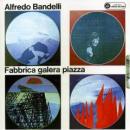
Chanson italienne – La ballata della Fiat – Alfredo Bandelli – 1970
Cette traduction est dédiée tout particulièrement à mon camarade et ami Vincent De Raeve, qui a publié un livre dont le titre est tout simplement « L'Usine ».
Lorsque Alfredo Bandelli écrit cette chanson, on est en 1970. En un temps où la classe ouvrière italienne est en pleine phase offensive; elle a repris courage, elle se réorganise; elle refuse le « compromis historique » que les partis, y compris de gauche, tentent d'installer. On a vu – avec le recul, près de quarante ans plus tard – que le peuple des usines n'avait pas tort de se méfier et où cette « sainte alliance » a mené, et pas seulement en Italie. Je pense à un de mes vieux professeurs de philosophie qui enseignait : « Quand on joue aux cons, on finit toujours par gagner... » La gauche a joué la carte de la collaboration avec le régime; le libéralisme est... (continua)
Cette traduction est dédiée tout particulièrement à mon camarade et ami Vincent De Raeve, qui a publié un livre dont le titre est tout simplement « L'Usine ».
Lorsque Alfredo Bandelli écrit cette chanson, on est en 1970. En un temps où la classe ouvrière italienne est en pleine phase offensive; elle a repris courage, elle se réorganise; elle refuse le « compromis historique » que les partis, y compris de gauche, tentent d'installer. On a vu – avec le recul, près de quarante ans plus tard – que le peuple des usines n'avait pas tort de se méfier et où cette « sainte alliance » a mené, et pas seulement en Italie. Je pense à un de mes vieux professeurs de philosophie qui enseignait : « Quand on joue aux cons, on finit toujours par gagner... » La gauche a joué la carte de la collaboration avec le régime; le libéralisme est... (continua)
LA BALLADE DE LA FIAT
(continua)
(continua)
inviata da Marco Valdo M.I. 12/11/2008 - 15:16
Our Bright Future

[2008]
Album: "Our Bright Future"
Da La Stampa
Vent'anni fa di questi tempi, fra il luccichio e il tum-tum delle discoteche si faceva largo una voce spoglia e un po' cavernosa: si accompagnava solo con la chitarra, e a sentire «Talkin' About A Revolution» quelli con ancora le spalline larghe sotto la giacca pensarono a una povera pazza, così dimessa e un po' mascolina, con la pelle nera coperta di tanti riccioli. Gli altri la ascoltarono al concerto per i 70 anni di Mandela a Londra o all'Amnesty International Tour che passò nell'88 da Torino con Bruce Springsteen, Peter Gabriel, Sting (più il povero Baglioni preso a pomodorate), e andarono a comprare il suo disco, chiamato solo «Tracy Chapman». Furono 18 milioni di copie nel mondo, record per un'opera prima poi superato solo da Alanis Morissette. Da allora la chanteuse e autrice di Boston si è trasferita a San Francisco, in una casa con... (continua)
Album: "Our Bright Future"
Da La Stampa
Vent'anni fa di questi tempi, fra il luccichio e il tum-tum delle discoteche si faceva largo una voce spoglia e un po' cavernosa: si accompagnava solo con la chitarra, e a sentire «Talkin' About A Revolution» quelli con ancora le spalline larghe sotto la giacca pensarono a una povera pazza, così dimessa e un po' mascolina, con la pelle nera coperta di tanti riccioli. Gli altri la ascoltarono al concerto per i 70 anni di Mandela a Londra o all'Amnesty International Tour che passò nell'88 da Torino con Bruce Springsteen, Peter Gabriel, Sting (più il povero Baglioni preso a pomodorate), e andarono a comprare il suo disco, chiamato solo «Tracy Chapman». Furono 18 milioni di copie nel mondo, record per un'opera prima poi superato solo da Alanis Morissette. Da allora la chanteuse e autrice di Boston si è trasferita a San Francisco, in una casa con... (continua)
To my father what of your sons?
(continua)
(continua)
inviata da daniela -k.d.- e adriana 12/11/2008 - 15:13
Brothers In Arms

questo canzone carina ma che sia giusta perchè secondo me la guerra deve finire in tutti paesi e ora giusto che c'è obama speriamo che cambi qualcosa..............caio a tutti!!!!
giorgia 12/11/2008 - 14:49
Just a Dream

[2007]
Testo e musica di Gordie Sampson, Steven McEwan, H. Lindsey
Lyrics and music by Gordie Sampson, Steven McEwan, H. Lindsey
Album: "Carnival Ride"
Testo e musica di Gordie Sampson, Steven McEwan, H. Lindsey
Lyrics and music by Gordie Sampson, Steven McEwan, H. Lindsey
Album: "Carnival Ride"
It was two weeks after the day she turned eighteen
(continua)
(continua)
inviata da daniela -k.d.- 12/11/2008 - 14:08
Odio por amor

[2008]
Trabajamos como dos locomotoras a todo vapor
(continua)
(continua)
inviata da daniela -k.d.- 12/11/2008 - 13:20
The Willing Conscript
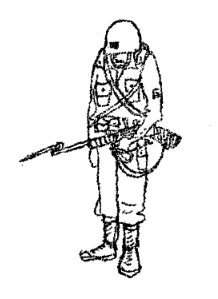
Words and Music by Tom Paxton.
Broadside #28, Late Jun. 1963
Non so in quale lavoro della sterminata produzione di Paxton sia compresa questa canzone...
Broadside #28, Late Jun. 1963
Non so in quale lavoro della sterminata produzione di Paxton sia compresa questa canzone...
Oh Sergeant I'm a draftee and I've just arrived in camp.
(continua)
(continua)
inviata da Alessandro 12/11/2008 - 13:17
×
![]()







